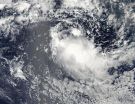(Press-News.org) Cities like Miami are all too familiar with hurricane-related power outages. But a Johns Hopkins University analysis finds climate change will give other major metro areas a lot to worry about in future storms.
Johns Hopkins engineers created a computer model to predict the increasing vulnerability to hurricanes of power grids in major cities on or relatively near the Atlantic and Gulf coasts. They factored historic hurricane information in with plausible scenarios for future storm behavior, given a global rise in average temperatures. With that data, the team could pinpoint which of 27 cities, from Texas to Maine, will become more susceptible to blackouts caused by future hurricanes.
Topping the list of cities most likely to see big increases in their power outage risk are New York; Philadelphia; Jacksonville, Florida; Virginia Beach, Virginia; and Hartford, Connecticut. Cities at the bottom of the list, whose future risk of outages is unlikely to dramatically change, include Memphis, Tennessee; Dallas; Pittsburgh; Atlanta; and Buffalo, New York.
Seth Guikema, an associate professor in the university's Department of Geography and Environmental Engineering, said his team's analysis could help metropolitan areas better plan for climate change.
Although planning for climate change is difficult due to the high degree of uncertainty about how hurricanes of the future will behave, the team examined a range of potential changes in hurricane activity and quantified how those changes are likely to influence power outage risk. By being able to anticipate these risks, officials have a chance to protect cities against damage and to reinforce their power grids, he said.
"We provide insight into how power systems along the Gulf and Atlantic coasts may be affected by climate changes, including which areas should be most concerned and which ones are unlikely to see substantial change," Guikema said. "If I'm mayor of Miami, we know about hurricanes, we know about outages and our system has been adapted for it. But if I'm mayor of Philadelphia, I might say, 'Whoa; we need to be doing more about this."
The research appears in the December issue of the journal Climatic Change. Johns Hopkins doctoral student Andrea Staid is the report's lead author.
Not surprisingly, the team's results depend strongly on location. If climate change indeed intensifies hurricane activity, some areas of the country would feel the impact of it more than others.
Cities already in the eye of the storm like Miami and New Orleans would remain so. But cities like New York and Philadelphia as well as some more inland urban areas would likely be increasingly susceptible to more frequent and intense storm activity, the team found. For both New York City and Philadelphia, the 100-year storm scenario, that is, the level of storm impacts expected to be exceeded on average once every hundred years, would be 50 percent higher. More people would lose power more often, and the worst storms would be substantially worse.
In that same type of 100-year storm situation, the researchers predict about a 30 percent increase in the number of customers without power in Miami and New Orleans relative to current climate conditions. In more geographically protected cities like Baltimore and Washington, D.C., there would be about a 20 percent increase in the number of customers without power in the 100-year storm.
"The range of results demonstrates the sensitivity of the U.S. power system to changes in storm behavior," Guikema said. "Infrastructure providers and emergency managers need to plan for hurricanes in a long-term manner and that planning has to take climate change into account."
INFORMATION:
The research was funded in part by the National Science Foundation grants 1149460, 1215872, 1331399 and 0968711.
Monstrous moonshine, a quirky pattern of the monster group in theoretical math, has a shadow - umbral moonshine. Mathematicians have now proved this insight, known as the Umbral Moonshine Conjecture, offering a formula with potential applications for everything from number theory to geometry to quantum physics.
"We've transformed the statement of the conjecture into something you could test, a finite calculation, and the conjecture proved to be true," says Ken Ono, a mathematician at Emory University. "Umbral moonshine has created a lot of excitement in the world of math ...
By blocking a widespread enzyme, Centenary researchers have shown they can slow down the movement of cells and potentially stop tumours from spreading and growing.
Using a new super-resolution microscope they've been able to see single molecules of the enzyme at work in a liver cancer cell line. Then they've used confocal microscopes to see how disrupting the enzyme slows down living cancer cells.
The enzyme is DPP9 (dipeptidyl peptidase 9) which the researchers at the Centenary Institute and the Sydney Medical School were first to discover and clone, in 1999. Ever ...
Tropical Cyclone Bakung is moving in a westerly direction over the open waters of the Southern Indian Ocean and NASA's Aqua satellite captured an image of the sea storm.
Aqua passed over Bakung on Dec. 12 at 07:35 UTC (2:35 a.m. EST) and the MODIS instrument aboard took a visible image of the storm. The image showed that deeper convection (stronger currents of rising air that form the thunderstorms that make up the tropical cyclone) was occurring around the low-level center of circulation, so the center was not apparent in the MODIS imagery. The bulk of the clouds associated ...
Natural gas from hydraulic fracturing generates income and, done well, can reduce greenhouse gas emissions, air pollution and water use compared to coal and even nuclear energy. However, widespread use of natural gas from fracking could slow the adoption of wind, solar and other renewables and, done poorly, release toxic chemicals into the environment.
Robert Jackson, the Kevin and Michelle Douglas Professor of Environment and Energy at the Stanford School of Earth Sciences, will discuss how to minimize the water and air impacts of fracking and other unconventional energy-extraction ...
Recent international climate talks have focused on the potential of reforestation and afforestation - planting trees in an area where there was no forest previously - to slow global warming. Increasingly, though, science is showing that planting more trees and increasing forest conservation can provide benefits beyond carbon storage, and that carbon-centric accounting is, in many cases, insufficient for climate mitigation policies.
Robert Jackson, the Kevin and Michelle Douglas Professor of Environment and Energy at the Stanford School of Earth Sciences, will discuss ...
Runoff from rainstorms in big cities can represent both threats and opportunities. Too much runoff in the wrong places causes flooding. Too little rainwater in the right places leads to dried-up creeks and rivers. Water that washes up pollution from city streets can dirty downstream watersheds. Figuring out the best solutions to these problems requires lots of data - data that are easy to get in highly developed countries, but much scarcer in others.
On Dec. 15 at the American Geophysical Union Fall Meeting in San Francisco, Perrine Hamel, a postdoctoral scholar with ...
Stanford scientists have found evidence that sections of the fault responsible for the 9.0 magnitude Tohoku earthquake that devastated northern Japan in 2011 were relieving seismic stress at a gradually accelerating rate for years before the quake.
This "decoupling" process, in which the edges of two tectonic plates that are frictionally locked together slowly became unstuck, transferred stress to adjacent sections that were still locked. As a result, the quake, which was the most powerful ever recorded to hit Japan, may have occurred earlier than it might have otherwise, ...
WASHINGTON, Dec. 15, 2014--Credit card fraud and identify theft are serious problems for consumers and industries. Though corporations and individuals work to improve safeguards, it has become increasingly difficult to protect financial data and personal information from criminal activity. Fortunately, new insights into quantum physics may soon offer a solution.
As reported in The Optical Society's (OSA) new high-impact journal Optica, a team of researchers from the Netherlands has harnessed the power of quantum mechanics to create a fraud-proof method for authenticating ...
A survey of more than 300 college students reveals that college students who use "fake weed" or synthetic THC are most likely to have tried the drug because they were curious. Rebecca Vidourek, a University of Cincinnati assistant professor of health promotion and assistant director of the Center for Prevention Science; Keith King, a UC professor of health promotion and director of the Center for Prevention Science; and Michelle Burbage, a graduate student and graduate assistant for UC's Health Promotion and Education Program, published their findings in the current issue ...
This news release is available in French. "Media reports about behavioural genetics unintentionally induce unfounded beliefs, therefore going against the educational purpose of scientific reporting," writes the University of Montreal's Alexandre Morin-Chassé, following his study of 1,500 Americans. "Among other things, we wanted to know if the public understood (or misunderstood) popular science articles about a new research field, genopolitics, and whether this popularization indeed helped people have an informed opinion on human genetics," Morin-Chassé explained.
The ...



